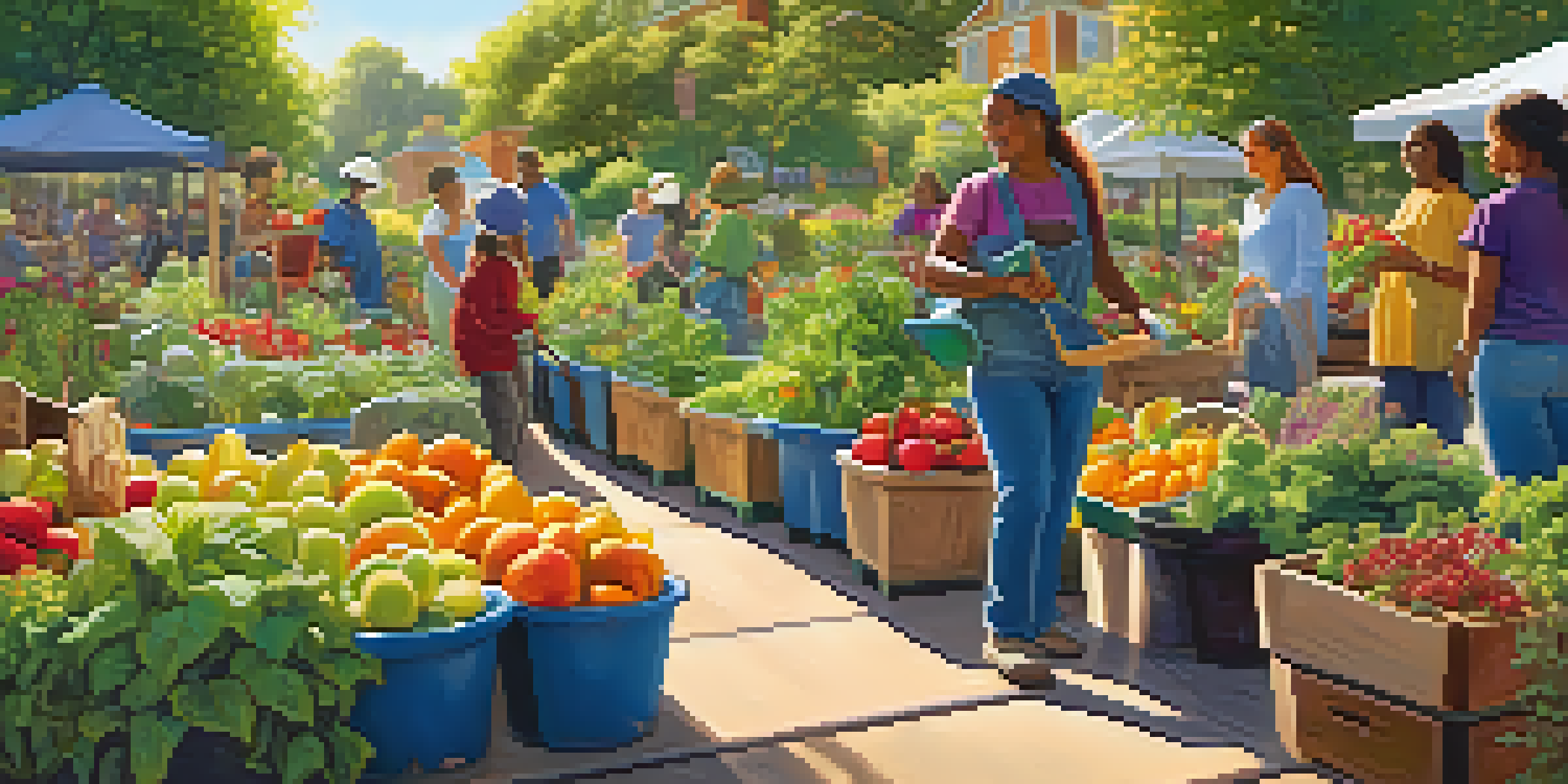Nutrition Programs in Charlotte: Enhancing Public Wellbeing

Understanding the Importance of Nutrition Programs
Nutrition programs play a crucial role in enhancing public wellbeing by promoting healthy eating habits. They help individuals make informed food choices that can lead to improved health outcomes. In Charlotte, these programs aim to address nutritional deficiencies and reduce obesity rates, which are rising concerns in many communities.
Let food be thy medicine and medicine be thy food.
By providing education, resources, and support, nutrition programs empower residents to take charge of their health. They often include workshops, cooking classes, and nutritional counseling, making it easier for participants to incorporate healthy foods into their daily lives. This focus on education is vital, as it equips individuals with the knowledge they need to sustain healthy habits long-term.
Moreover, nutrition programs can foster community engagement by bringing people together around a common goal—better health. By participating in these initiatives, residents can build connections and support systems, creating a ripple effect that extends beyond just personal health.
Key Nutrition Programs in Charlotte
Charlotte boasts a variety of nutrition programs designed to cater to different community needs. Initiatives like 'Healthy Charlotte' focus on educating families about balanced diets and cooking nutritious meals on a budget. These programs often collaborate with local farmers and markets, ensuring that participants have access to fresh, affordable produce.

Another significant program is the 'Charlotte-Mecklenburg Schools Nutrition Services,' which provides healthy meals to students. By ensuring that children receive balanced meals at school, this program not only supports their academic performance but also fosters lifelong healthy eating habits. It’s a wonderful example of how nutrition can influence future generations.
Nutrition Programs Enhance Wellbeing
These initiatives promote healthy eating habits and empower residents to make informed food choices.
Additionally, organizations like 'Loaves & Fishes' offer meal assistance to families in need, highlighting the importance of food security. This program helps combat hunger while also addressing nutritional needs, ensuring that those who are struggling can access healthy food options.
The Role of Community Gardens
Community gardens are a fantastic complement to nutrition programs in Charlotte. They provide residents with hands-on experience in growing their own fruits and vegetables, which fosters a deeper understanding of nutrition. By cultivating these gardens, participants not only reap the benefits of fresh produce but also learn valuable gardening skills.
The greatest wealth is health.
These gardens also serve as community hubs where people can come together, share knowledge, and build relationships. The social aspect of gardening can significantly enhance mental wellbeing, making it a multifaceted approach to improving public health. For many, it’s more than just gardening; it’s about cultivating a sense of belonging and community.
Furthermore, community gardens often host workshops and events that educate attendees on topics like sustainable farming and cooking with fresh ingredients. This holistic approach ensures that participants are not only growing food but also learning how to prepare it in healthy ways.
Partnerships with Local Organizations
Partnerships with local organizations are vital to the success of nutrition programs in Charlotte. Collaborations with health departments, schools, and non-profits enable these programs to expand their reach and resources. By pooling knowledge and expertise, they create a more robust support system for community members.
For instance, local food banks often partner with nutrition programs to provide education on healthy food choices. By integrating nutritional education with food distribution, these partnerships help ensure that families not only receive food but also understand how to use it effectively. This dual approach is essential for fostering long-term health improvements.
Community Engagement Through Gardening
Community gardens foster relationships and provide hands-on experiences that deepen understanding of nutrition.
Moreover, these partnerships can lead to innovative solutions for food deserts—areas with limited access to fresh food. By working together, organizations can establish mobile markets or cooking demonstrations in underserved neighborhoods, making nutritious options more accessible to all.
The Impact of Technology on Nutrition Education
In an increasingly digital world, technology is revolutionizing nutrition education in Charlotte. Online platforms and mobile apps are making it easier for residents to access nutritional information and resources. This shift towards digital solutions allows for flexible learning, catering to individuals' varied schedules and preferences.
For example, many programs now offer virtual cooking classes and webinars, enabling participants to learn from the comfort of their homes. These sessions often include interactive elements, such as Q&A segments, making the experience more engaging. This adaptability is particularly important for reaching people who may face barriers in attending in-person events.
Additionally, social media has become a powerful tool for promoting healthy eating habits. Nutrition programs can leverage platforms like Instagram and Facebook to share recipes, tips, and success stories, fostering a sense of community and support online. This digital outreach broadens the conversation around nutrition, encouraging even more residents to engage with these programs.
Success Stories from Charlotte Residents
Success stories are at the heart of Charlotte's nutrition programs, showcasing the positive impact on individuals and families. One inspiring example is a local family who transformed their eating habits through participation in a nutrition workshop. By learning how to prepare healthy meals on a budget, they not only improved their health but also strengthened family bonds during meal prep.
Another notable success involves a participant in a community garden program who discovered a passion for gardening. This newfound interest led to healthier eating choices and even inspired others in her neighborhood to join in. Her journey exemplifies how nutrition programs can spark change, encouraging people to take ownership of their health.
Technology Revolutionizes Nutrition Edu
Digital platforms and social media are expanding access to nutrition education, making it more engaging and accessible.
These stories serve as powerful reminders of the potential for positive change. They highlight how nutrition programs can foster resilience, creativity, and a sense of community, ultimately contributing to a healthier Charlotte.
Future Directions for Nutrition Initiatives
Looking ahead, the future of nutrition programs in Charlotte is bright, with opportunities for growth and innovation. There’s a growing recognition of the need for personalized nutrition approaches that cater to diverse community needs. This could involve tailoring programs to address specific dietary restrictions, cultural preferences, or health conditions.
Moreover, continued investment in local agriculture will play a crucial role in enhancing these initiatives. By supporting local farmers and sustainable practices, nutrition programs can ensure that fresh produce remains accessible and affordable for all. This not only benefits individual health but also strengthens the community’s economy.

Finally, ongoing evaluation and feedback from participants will be essential in shaping the future of these programs. By understanding what works and what doesn’t, program leaders can adapt their strategies to better serve the community, ensuring that Charlotte continues to thrive in its pursuit of public wellbeing.